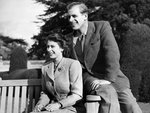


LONDON — By the dozens, then the hundreds, then the thousands, Britons from all walks of life converged on the ornate gates of Buckingham Palace in central London, first in fearful anticipation, then in mourning for the only monarch that virtually any of them had ever known.
Some wept. Some clasped hands. Others gazed around somberly, lost in their own thoughts.
Even before the formal announcement late Thursday afternoon of Queen Elizabeth II’s death at 96, as the day’s last light was vanishing amid bursts of rain, crowds had begun to form outside the palace, the official residence of British monarchs since the 19th century.
“It’s a somber moment,” said Jeffrey Julien, 57, a Londoner who watched the British flag being lowered to half-staff to mark Elizabeth’s death. “She is one public person in this country who has been present on TV, in news, for my entire life. She was the constant.”
As word spread earlier in the day that members of the royal family were hurrying to the queen’s side at her summer retreat of Balmoral Castle, in Scotland, crowds in the capital broke into a rendition of “God Save the Queen.”
Later, they switched to different lyrics: “God save the king,” in recognition of the seamless transition to a new sovereign, King Charles III, the late queen’s eldest son.
Above the coalescing throngs at the Queen Victoria Memorial in front of Buckingham Palace, a rainbow implausibly appeared — a scene captured in countless photos and that swiftly spread online.
Mourners held flowers and candles. Pictures of corgis lit up their smartphones — the queen’s favorite dog breed — as did photos of Elizabeth waving to crowds in the 1950s and others of more recent public appearances, including with then-President Obama and his wife, Michelle.
Amal Shezad, an American visiting from New York, said she had come to get a glimpse of a familiar touristic sight, the changing of the guard. Instead, she saw what would likely be a once-in-a-lifetime event, the real-time grieving for a dead queen.
“I’m witnessing history,” said Shezad.
The death of Elizabeth, whose seven decades on the throne provided a powerful sense of national continuity, comes at a turbulent juncture for Britain.
A new and untested prime minister, Liz Truss, is at the political helm, having formally presented herself to the queen only two days earlier. Winter portends a punishing energy crunch, with gas and oil prices skyrocketing past what many can afford.
Economic and social fallout from the COVID-19 pandemic and Brexit, the 2020 split from the European Union, is only now beginning to be fully felt. Britain has emerged as one of the staunchest international supporters of war-battered Ukraine, with all the obligations that entails.
The BBC’s presenters had switched to somber black garb even before the official announcement of Elizabeth’s death, first flashing on smartphone and television screens, then swiftly spread to stunned passersby.
Aboard a British Airways flight from New York’s John F. Kennedy Airport to London‘s Heathrow, the captain took to the intercom shortly before landing to inform passengers of Elizabeth’s passing. Telling passengers he had sorrowful news to convey and wanted to give people time to reflect, the captain said the long-lived monarch had died with her family by her side.
“I thought I should at least tell you before you arrive at the terminal, as I know many will be very, very sad about this,” he said, calling it the “saddest of days.” Cabin crew wept in the rear of the plane and passed teary-eyed up and down the aisles.
“I suppose the British monarchy goes on,” the captain told passengers. “I should finish it by saying, ‘God save the new king.’”
In a brief statement, Charles paid tribute to a “cherished sovereign and a much-loved mother.”
British and television radio stations all switched to coverage of the queen’s death. National mourning and remembrance, as well as adjustment to life under a new monarch, will last for days, if not weeks.
Not everyone saw it as a watershed moment.
“I don’t feel good or bad about her,” said Jaswinder Singh, a restaurant worker who was leaving his shift early Thursday in the tony Mayfair neighborhood, near Buckingham Palace, as the commotion interrupted his usual commute home across the River Thames.
“We have a lot else going on here than the queen,” he said. “The cost of everything is increasing; pay is not. We have a new prime minister who claims she can solve it. I don’t know.”
Around the British capital, boisterous pubs and buzzing restaurants fell silent at the news.
Alistair Jeffrey, 29, a bartender, was having a beer outside the Victoria pub in Dalston, an East London neighborhood, when he learned of the queen’s death.
Over the summer, when Britain held a days-long Platinum Jubilee celebration of Elizabeth’s record-setting 70 years on the throne, Jeffrey said he left London to avoid “commotion over the queen.” Now, as the country mourns, Jeffrey said he thought he’d stay put in the capital.
“It is just so unusual and historic, no matter what you think of her, if you like her,” he said. “The city feels different already.”
David Lebowitz, a taxi driver waiting for a fare outside the historic Langham Hotel, pointed up the contrast between the churn of Britain’s politics, including the recent ouster of Boris Johnson as prime minister, and the seeming timelessness of Elizabeth’s reign.
“Look at our government — all it is is scandal and prime minister resignations,” he said. “The queen stayed with us. You could have your politics one way or another, but you would still admire the queen.”
Kaleem is a staff writer and Boyle a special correspondent.